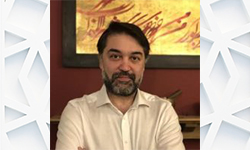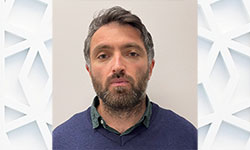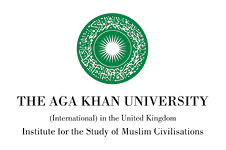Our Team

Philip Wood
Philip Wood is the Tejpar Professor of Inter-Religious Studies at The Aga Khan University. He studies West Asia before and after the Arab conquests (roughly 400-900CE). He is particularly interested in the history of Christian communities in Syria and Iraq, and in the formation and preservation of group identities more broadly. His books have analysed Syriac speaking Christian groups in the later Roman Empire, the Sasanian Empire and the Abbasid Caliphate. He has recently published The Imam of the Christians. The World of Dionysius of Tel-mahre, 750-850 (Princeton, 2021) and, together with Prof. Leif Stenberg, What is Islamic Studies? European and North American Approaches to a Contested Field (Edinburgh, 2022).
Read More
Post-Doctoral

Mehdy Shaddel
Mehdy Shaddel (May) is a scholar of Near Eastern history specialising in Islamic origins and the socio-economic, political, and religious history of the early Muslim empire. At its core, my work blends together philology with theoretical and comparative insights to address broader interdisciplinary themes such as apocalypticism and eschatology and comparative empires and state formation, with early Islam as a case-study. He is currently working on a monograph, tentatively entitled The Sufyanids and the Beginnings of the Second Muslim Civil War, 660-684 CE, and editions and translations of the Kitāb al-wuzarāʾ wa-l-kuttābof Muḥammad ibn ʿAbdūs al-Jahshiyārī (with Robert G. Hoyland) and (with Samuel J. Noble) the Arabic versions of the pseudonymous anti-Jewish tractate Doctrina Iacobi nuper baptizati.
Read More

Bogdan Draghici
Bogdan Draghici is a postdoctoral Fellow paid for by funds from the Tejpar Professor in inter-religious studies. He is a specialist in Syriac studies and completed his DPhil in Oxford in 2023 with David Taylor on the subject of the eleventh century West Syrian theologian and polemicist Dionysius bar Salibi.
Read More

Samuel Noble
Samuel Noble received his PhD in Religious Studies from KU Leuven in 2021. He is particularly interested in the social and intellectual history of the Melkite community of Syria, the history of Byzantine Antioch and the Graeco-Arabic translation movement.

Yasmine Ilkhani
Yasmin Ilkhani is a Post-Doctoral Research Fellow at the Aga Khan University’s Institute for the Study of Muslim Civilisations (AKU-ISMC). Yasmin will be working with Professor Philip Wood as part of a research project on Group formation in the Abbasid period. Yasmin completed her BA at Shahid Beheshti in Tehran and PhD in Anthropology at Durham University. Yasmin specialises in the Zoroastrian community in Yazd in Iran.
Read More
Affiliated Researchers

Anna Chrysostomides
Anna is a Lecturer in Islamic History at Queen Mary, University of London. She researches the social dynamics of conversion between Eastern Christianity and Islam from the 8th through the 10th centuries. She is particularly interested in people who vacillated between Christianity and Islam, Muslim participation in Christian rituals and vice versa, and social situationons which would have engendered people identifying with both religions such as: Christian wives of Muslim husbands, children of those unions, Christian mawālī of Muslims, and Christian slaves of Muslims.
Read More

Arash Zeini
I am historian/philologist of pre-Islamic Iranian cultures and languages, focusing on Zoroastrianism, particularly the late antique exegesis of the Avesta. My research interests include the religious culture of the Sasanian era, the Middle Persian administrative documents and digital humanities.
As a postdoctoral researcher on the Invisible East project, I primarily work on the Persian documents from the medieval Islamicate East (Iran and Central Asia ca. 12th to early 13th century CE), contextualising these within the wider research aims of the Invisible East programme.
Read More

Aslisho Qurboniev
Aslisho Qurboniev is an Assistant Professor at the Institute for Ismaili Studies. He specialises in using digital methods to study the social and intellectual history of Muslim North Africa, especially on the scholarly networks and textual communities of Malikis under Fatimid rule in the tenth century. He holds a Phd from Cambridge and was formerly a member of the KITAB project, hosted at AKU-ISMC.

Ed Hayes
Edmund Hayes is a historian of the social, cultural and religious history of the medieval Middle East. He has studied Shi’i Islam intensively, including topics such as the agents who mediated for the Shi’i Imams, alms tax collection, and excommunication. He works with varied primary source material in Arabic and Persian primary sources to see how social institutions shaped, and were shaped by, ideas and beliefs. He has conducted research addressing the complex ways in which Islamic law (Shari’a) intersected with social life, governance and political developments; he has studied literary expressions of social and ethnic identity; and he has looked at the ways in which the regulation of sexuality and the body impacts discourse.
At Radboud, Edmund is part of Maaike van Berkel’s “Source of Life” project, researching water management in premodern Middle Eastern cities. He focuses on two major areas: water institutions in the city of Damascus; and the way in which late antique and medieval Islamic legal texts articulated the nature and use of water.
Read More


